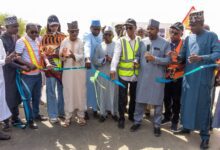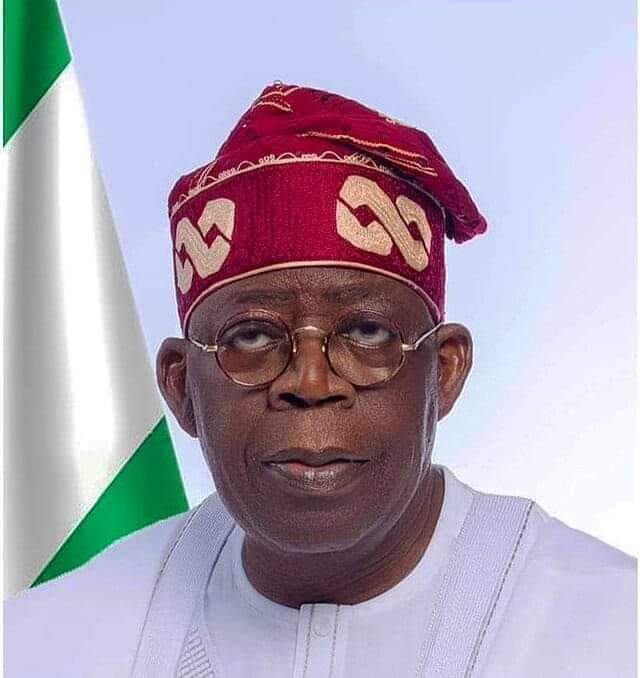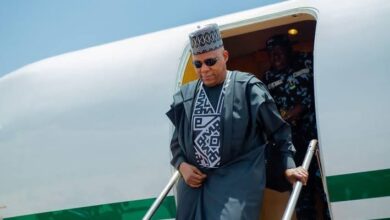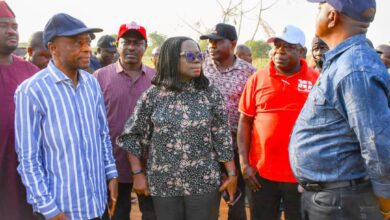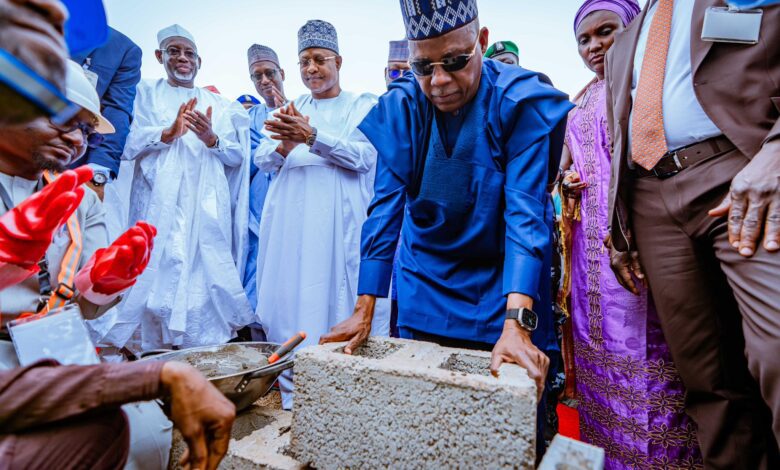
President Bola Tinubu has laid the foundation for the official launch of the Resettlement Scheme for Persons Impacted by Conflict (RSPIC) across Nigeria.
The project marks a shift in the government’s approach to internal displacement and conflict resolution and a commitment of President Tinubu to not just temporary relief but long-term rehabilitation and reintegration of affected communities.
Senior Special Assistant to the Vice President on Media and Communications, Stanley Nkwocha in a statement on Friday said, while speaking at the groundbreaking ceremony of the pilot phase of the project in Tudun Biri, Kaduna State, President Tinubu who was represented by Vice President Kashim Shettima said, “There couldn’t have been a better place for the take-off of this intervention than this diverse state.”
According to the President “Kaduna State has offered us a launchpad to venture into the communities dislodged by conflict. For so long, we have been held hostage by the fear of ourselves and allowed preventable incidents to escalate into transgenerational disputes.
“Today, we gather to say, ‘Enough is enough.'”
Earlier in February, VP Shettima had inaugurated a steering committee to coordinate the implementation of the initiative in fulfillment of President Bola Ahmed Tinubu’s promise to improve the lives of all Nigerians.
The committee chaired by Minister of Housing and Urban Development, Arc Ahmed Musa Dangiwa, also has representatives of governors of the benefiting states as members.
Other members of the committee include the Minister of Agriculture and Food Security, Sen. Abubakar Kyari; representatives of the Chairman of the Economic and Financial Crimes Commission (EFCC), Director General of the Bureau of Public Procurement (BPP), BUA Group, Dangote Group and the Director General of NEMA, among others.
The project will initially focus on seven states that have been disproportionately affected by farmers-herders conflicts. They are Sokoto, Kebbi, Benue, Katsina, Zamfara, Niger, and Kaduna State.
President Tinubu said the administration is determined to break the cycle of violence and displacement that has plagued various parts of the country for years. “Our journey to this point has been long and arduous, but today, we converge in this historic city to demonstrate our resolve to overcome adversity.”
The RSPIC is designed as a multi-faceted intervention that goes beyond mere infrastructure development. According to the President, the scheme will “construct residences, roads, schools, and essential facilities for victims of conflict” while also providing “a dignified environment to live and to dream.”
Governor Uba Sani’s efforts in promoting unity were particularly praised by the President, who noted, “In just about a year in office, His Excellency Governor Uba Sani has been an inspiration for unity in this beautiful state. His approach is not only a template for other state governors but also for the nation at large.”
President Tinubu said, “The non-kinetic interventions we have explored since taking office are best demonstrated by our state governors, and Kaduna is a light of hope in this aspect.”
The President noted the national significance of the project saying “Conflict and displacement, to us, are not merely regional issues; they are national concerns that demand a unified response. They threaten the very fabric of our society, and it is only through justice, distribution of democratic dividends, and collaboration that we can overcome these challenges.”
The President also made a direct and emotional appeal to those affected by conflict: “To those who have been displaced by conflict, I say this: We see you, we hear you, and we stand with you. Your strength and resilience inspire us all, and under my leadership, we commit to bolstering our nation’s security infrastructure and advancing peace.”
“Now is our time for permanent solutions. This intervention is ours together,” the President added.
Earlier in his address, Governor Uba Sani of Kaduna State praised the initiative, stating, “Today is a day of joy because we are about to set the stage for the transformation of this community.”
He outlined ongoing efforts to support Tudun Biri, including “constructing a six kilometres road and building a skill acquisition centre” and a clinic to cater to the medical needs of the people.”
Governor Sani expressed gratitude to President Tinubu, describing the choice of Tudun Biri for the project as “a clear demonstration of the President’s commitment to wiping off the tears of Tudun Biri people and the poor, vulnerable and underserved in our country.”
Also speaking, Director-General of the National Emergency Management Agency (NEMA), Zubaida Umar, noted the broader implications of the project as it translates to the improvement of the welfare of the citizens.
She stated, “Let us remember that every brick laid, and every path paved is a symbol of our shared commitment to a future where peace and prosperity and unity reign supreme.”
Umar added that the project would “pave the way for similar initiatives in other states that would follow.”
Responding, the Dangaladiman Zauzau, District Head of Rigasa, Arc. Mohammad Aminu Idris, said, “We are happy that this pledge is being fulfilled. This is a commitment on the part of the government which we are very proud of.”
He expressed gratitude on behalf of the Zazzau Emirate Council, noting, “We sincerely thank Mr President for honouring this promise.”
Dignitaries who attended the event included Governor of Jigawa State, Umar Namadi; Deputy Governor of Kaduna State, Dr. Hadiza Sabuwa Balarabe; Minister of Housing and Urban Development, Arc Ahmed Musa Dangiwa; representatives of the governors of Kano, Katsina and Kwara States.
Others are the representative of the Chairman of Senate Committee on Special Duties, Sen. Kaka Shehu Lawan; the representative of the Chairman, House Committee on Emergency and Disaster Management, Hon. Joseph Bassey; Speaker of the Kaduna State House of Assembly, Yusuf Liman; Special Adviser to the President on Political Matters, Hakeem Baba-Ahmed, and Secretary to Kaduna State Government, Dr. Abdulkadir Muazu Mayere, among many others.


